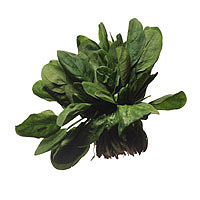Search Healthnotes
Spinach

Preparation, Uses, & Tips
Spinach is usually very sandy and needs thorough washing. Trim the roots and then swish the leaves in a large bowl of water. Place the spinach in a colander, change the water in the bowl, and repeat. Do this several times until the water remains clear. If the spinach is being used in a salad or is being sautéed, pat the leaves dry with paper towel or dry them in a salad spinner.
Spinach can be consumed cooked or raw. Baby spinach leaves are especially good in salads with bleu cheese, walnuts, red onions, and a vinaigrette dressing.
Spinach cooks very quickly, and doesn’t need added water. Just place it in a pan, cover, and simmer for two to four minutes until it wilts; spinach is also excellent when steamed, or it can be sautéed in olive oil with garlic for three or four minutes.
Spinach is a good addition to stews and to soups that contain beans, pasta, or potatoes, or to any kind of curry dish. Spinach can also be creamed. Cook the spinach, then purée in a food processor, adding your choice of ricotta cheese, cream sauce, or soft tofu. Add herbs, salt, and pepper, and use as a stuffing for lasagna or pasta shells, or toss with pasta or rice. Creamed spinach can also be thinned with broth or milk to make soup.
Good seasonings for spinach include fresh lemon juice, vinegar, garlic, dill, parsley, basil, nutmeg, and mushrooms.
Copyright © 2026 TraceGains, Inc. All rights reserved.
Learn more about TraceGains, the company.
The information presented in the Food Guide is for informational purposes only and was created by a team of US–registered dietitians and food experts. Consult your doctor, practitioner, and/or pharmacist for any health problem and before using any supplements, making dietary changes, or before making any changes in prescribed medications. Information expires December 2026.









